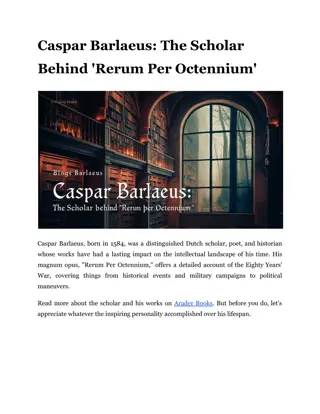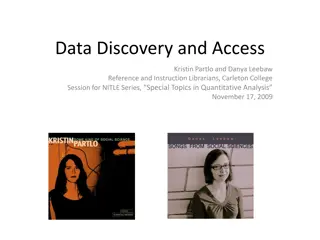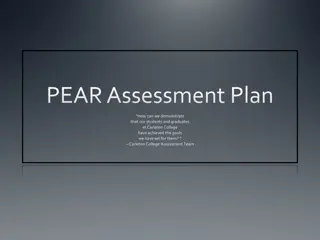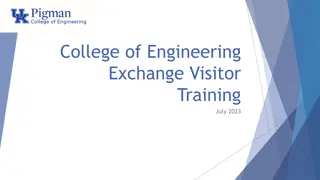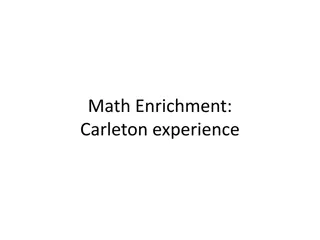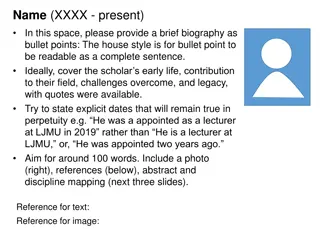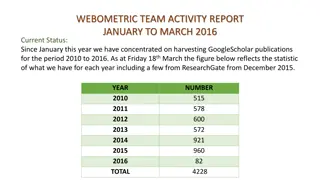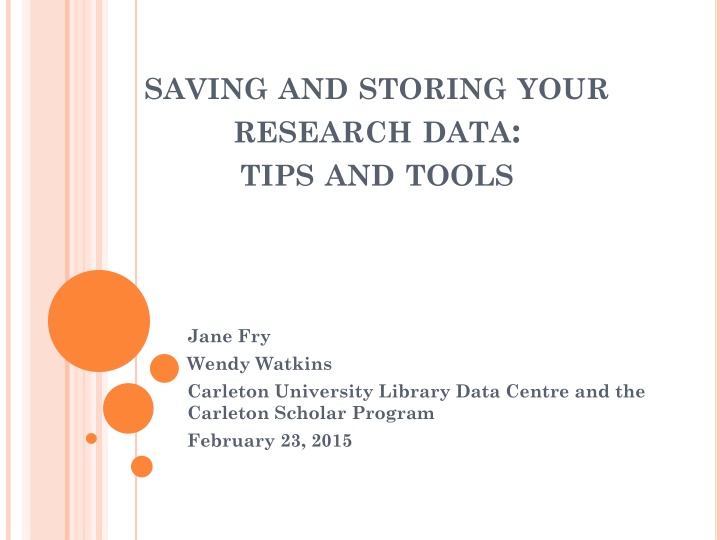
Effective Research Data Management Strategies and Tools
Discover the significance of research data, strategies for sharing and storing data, metadata essentials, and tools like Data Management Plans (DMP) and Dataverse. Learn how to curate data effectively to support your research project.
Download Presentation

Please find below an Image/Link to download the presentation.
The content on the website is provided AS IS for your information and personal use only. It may not be sold, licensed, or shared on other websites without obtaining consent from the author. If you encounter any issues during the download, it is possible that the publisher has removed the file from their server.
You are allowed to download the files provided on this website for personal or commercial use, subject to the condition that they are used lawfully. All files are the property of their respective owners.
The content on the website is provided AS IS for your information and personal use only. It may not be sold, licensed, or shared on other websites without obtaining consent from the author.
E N D
Presentation Transcript
SAVING AND STORING YOUR RESEARCH DATA: TIPS AND TOOLS Jane Fry Wendy Watkins Carleton University Library Data Centre and the Carleton Scholar Program February 23, 2015
AGENDA Definition of Research Data Why are Research Data important? What do we mean by Sharing your Research Data? Why are we concentrating on this now? Tri-Council Consultation 2013-14 Benefits of Sharing your Research Data What are metadata and why are they important? Metadata standards by discipline How do we start? Elements of a Research Data Management Plan DMP Tool and Dataverse: Tools to Aid in Data Sharing Research Data Management with MANTRA Video Questions and discussion 2
DEFINITIONOFRESEARCHDATA Research data are digital information, structured through methodology for the purpose of producing new knowledge. Not all digital information is research data, but all have the potential to become research data. Digital Information + Methodology = Research Data used to produce new knowledge 3
WHYARE RESEARCH DATA IMPORTANT? They support the original research. They are a deterrent to research fraud. They increase in value if they can be repurposed and shared. 4
WHATDOWEMEANBY SHARINGYOUR RESEARCHDATA? Research data can be shared in a number of ways: informally, from researcher to researcher; deposited in a self-archiving system; deposited in a specialist data centre - dedicated to archiving, preserving and disseminating digital data; and deposited in an institutional repository. 5
WHATDOYOUNEEDTODOTOSHAREYOUR RESEARCHDATA? Need to apply sound practices in the creation of data for current and future purposes AKA data curation or the preservation and maintenance of digital assets AKA data stewardship for the lifecycle of the research project Starts with a Research Data Management Plan (RDMP) 6
WHYAREWECONCENTRATINGONTHIS NOW? Many international funders already require this Tri-Council (SSHRC, CIHR and NSERC) + CFI and others are working on a policy requiring Research Data Management Plans on all funding applications Genome Canada requires this now We should be ahead of the curve in this If we get our ducks in order first, they will adopt our protocols Establishing good practices now will pay off in the future 7
TRI COUNCIL CONSULTATION 2013/2014 Capitalizing on Big Data: Toward a Policy Framework for Advancing Digital Scholarship in Canada See http://www.sshrc-crsh.gc.ca/about- au_sujet/publications/digital_scholarship_consultation_e.pdf Likely outcome: a requirement that all grant applications include specific data sharing plans including identified costs of data collection/analysis and preservation of results and associated datasets 8
BENEFITSOFSHARING YOUR RESEARCH DATA Confirmation of original findings They are essential for you to defend your research Further research Teaching Planning follow-up studies Conducting trend analyses 9
What are Metadata? Data about data The key to research data re-use Documentation in standardized and structured form Ideally computer-ready Why are they important? They explain your data You, as the researcher, are the best person to answer questions about your data! 10 http://www.dataenthusiast.com/wp-content/uploads/2011/10/meta_data_standard_transmission1.jpg Thanks to Jeff Moon, Queen s University Library
Metadata Standards Vary by Discipline Thanks to Jeff Moon, Queen s University Library 11
HOWDOWESTART? Research Data Management lifecycle http://www.data-archive.ac.uk/create-manage/life-cycle 13
ELEMENTSOFA RESEARCH DATA MANAGEMENT PLAN (RDMP) Funder and Data Description Data Collection Documentation and Metadata Storage and Backup Preservation Data Sharing and Re-use Responsibilities and Resources This template is taken from the University of Alberta s Data Management Plan Builder (https://dmp.library.ualberta.ca/projects/my-project- university-of-alberta-template--130?show_form=yes) 14
FUNDERAND DATA DESCRIPTION Different funders have slightly different requirements for the content of Data Management Plans The DMP Builder (one of the tools) will provide the proper template, depending on the funder s requirements The data description is a brief summary of the overall project It is not necessary in every case Details are provided in the following sections 15
DATA COLLECTION What types of data will you collect, create, acquire and/or record? What file formats will your data be collected in? How will you will securely store and transfer the data? Estimate how much storage space you will require (in megabytes, gigabytes, terabytes) and growth of the project over time Are there are any existing data that you can re-use? If so, explain how you will obtain that data and integrate it into your research project. What conventions and procedures will you use to structure, name and version control your files to ensure that your data is well-organized? 16
DOCUMENTATIONANDMETADATA What documentation will be needed for the data to be read and interpreted correctly in the future? study-level documentation data-level description any other contextual information required to make the data usable by other researchers List the metadata standard and tools you will use to document and describe your data. If there is not an appropriate standard, how will you ensure consistency in your documentation? How will you make sure that documentation is created or captured consistently throughout your project? 17
STORAGEAND BACKUP How will your data be stored and backed up during your research project? How will you ensure that sensitive data is stored securely and only accessible to the research team during the research project? What sort of encryption will you use? Will you use a data repository with security? 18
PRESERVATION Data selected for preservation and access depend on different factors It may be feasible to preserve all versions of the data e.g. raw, processed, analyzed, final It may be preferable to only keep only selected data e.g. transcripts instead of audio interviews At the end of your research project, where will you deposit your data for long-term preservation and access? 19
DATASHARINGANDREUSE What data will you be sharing and in what form? e.g. raw, processed, analyzed, final Which data may need to be shared in order to meet institutional or funding requirements? Which data may be restricted because of confidentiality/privacy issues? How will you be sharing your data? Include a brief description of any resources needed to share your data (equipment, systems, expertise, etc.). Describe whether there will be any restrictions placed on your data when they are made available and who may access them. 20
RESPONSIBILITIESAND RESOURCES Who will be responsible for data management during the lifecycle of the project? What will happen when personnel changes occur or if the principal investigator leaves the institution before the project has concluded? Who will be responsible for data sharing and preservation after the project has concluded? What resources will you require to implement your plan? How much will this cost (estimation)? 21
DMP BUILDERAND DATAVERSE: TOOLSTOAIDINDATASHARING DMP Builder Located at the University of Alberta at present Will become part of the National Research Data Infrastructure in the near future Provides step-by-step guidance to developing a plan Dataverse Located at Scholars Portal Provides safe and secure storage for your research data Allows you to set limits on level of access for your team 22
RESEARCH DATA MANAGEMENTWITH MANTRA MANTRA is a free online course designed for researchers or others who manage digital data as part of a research project. See more at: http://datalib.edina.ac.uk/mantra/#sthash.kTnRXTdV.dpuf 23
VIDEO Data Management and Sharing http://www.youtube.com/watch?v=N2zK3sAtr-4#t=17 24










